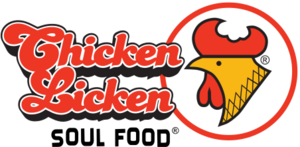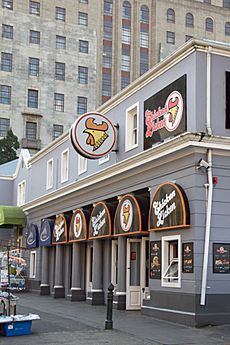Chicken Licken (restaurant) facts for kids
 |
|
|
Trade name
|
Chicken Licken |
|---|---|
| Private | |
| Industry | Fast food Franchising |
| Founded | Ridgeway, Gauteng 1981 |
| Founder | George Sombonos (1949–2016) |
| Headquarters | , |
|
Number of locations
|
259 (2013) |
|
Key people
|
Chantal Sombonos |
| Products | Fried chicken |
| Revenue | R1.3 billion (2013) |
Chicken Licken is a popular fast-food restaurant chain in South Africa. It is famous for its fried chicken. In 2010, Chicken Licken had a 5% share of South Africa's fast food market. This was the same as McDonald's. A study in 2011 said that Chicken Licken is the "largest non-American-owned fried chicken franchise in the world".
Contents
The Story of Chicken Licken
Chicken Licken was started by George Sombonos in South Africa. His father was a Greek immigrant who owned a restaurant. George learned about the restaurant business in the 1970s. He worked at his father's restaurant, the Dairy Den, in Ridgeway, a part of Johannesburg.
How the Secret Recipe Began
In 1972, George traveled to the United States. He bought a secret fried chicken recipe from a fast food place in Waco, Texas. He paid US $1,000 for it. He then brought this recipe back to the Dairy Den.
Serving All Customers
In 1975, George started serving black customers in their cars. This was because laws at the time stopped them from going inside restaurants. In 1976, he added a drive-through service at the Dairy Den. He got this idea from seeing it at Wendy's restaurants in the US.
Opening the First Restaurant
George's father passed away in 1980. In 1981, George opened the first Chicken Licken restaurant. It was built on the same spot as the old Dairy Den. In 1982, he gave away the first two franchises. These were in Soweto and Alexandra. He couldn't sell them because the company was new.
Growth During Difficult Times
Chicken Licken became well-known in the townships during apartheid. This helped it gain many loyal customers among black South Africans. However, there were difficult times in the townships in the mid-1980s. This affected the company's business until 1991. George's daughter, Chantal, started working at Chicken Licken in 2001. She is expected to take over the family business.
Where You Can Find Chicken Licken
At first, new Chicken Licken restaurants only opened in South African townships. After the apartheid era ended in 1994, many black middle-class families moved out of the townships. So, the company started focusing on opening stores in richer areas and big shopping malls.
Number of Stores
As of 2013, there were 247 Chicken Licken restaurants in South Africa. There were also 12 stores in Botswana. In 2012, only 12 of the South African stores were owned by the company. This included their six most successful restaurants.
International Challenges
Trying to open stores in other African countries has been hard. Stores in Zimbabwe, Nigeria, and Mauritius closed down. This was due to problems with the people running the franchises. There were also issues with getting chickens, electricity, and money for ingredients. Stores in Lesotho and Swaziland also closed because of bad business experiences. As of 2025, there are talks about opening a store in Bronx, New York.
Countries with Chicken Licken
- Botswana – 18 stores (2021)
- South Africa – 250 stores (2013)
Chicken Licken's Brand and Style

In 1981, George Sombonos started Golden Fried Chicken (Pty) Ltd. He registered the name Chicken Licken. This name came from the "Henny Penny" fable. A waiter suggested it. The restaurants and packaging have been updated. The menu changes every year. However, the company logo has stayed the same since 1981. Chicken Licken's food is made to suit local tastes. Their most popular item is their hot wings, which started in 1992.
Registered Trademarks
Some of Chicken Licken's registered trademarks in South Africa include:
- Soul Food
- Full house
- Hot wings
- Popcorn Chicken
Golden Fried Chicken (Pty) Ltd, which is the company that runs Chicken Licken, owns the trademark for the word soul in South Africa. This applies to restaurants, snack bars, cafes, and catering services.
Affordable and Popular
Chicken Licken's food is usually cheaper than its main rivals in South Africa, KFC and Nando's. In 2007, Chicken Licken was ranked second after KFC in a survey of fast food chains. Nando's was close behind. This survey looked at how well people knew and trusted the brands.
Famous Advertisements
Chicken Licken is known for its funny TV commercials. Early ads were created by and starred actor Joe Mafela. He also wrote the company's famous jingle: "It's good, good, good, it's good its nice." Later ads featured Dr CL Phunk, played by actor Sydney Hall. This character offered Chicken Licken as a cure for everything.
In 2007, George Sombonos won an award for his advertising. This was for a commercial called "25 Yrs of Soul." It featured the 1983 song "Burn Out" by Sipho "Hotstix" Mabuse. In 2013, he won another award for his marketing leadership.
Who Supplies Chicken Licken?
Chicken Licken gets its chickens from Rainbow Chicken Limited. This is South Africa's biggest chicken producer. In the past, Chicken Licken has bought chickens from Brazil. This happened when Brazilian sellers offered lower prices. Chicken Licken gets its spices from Robertsons Spices, a Unilever brand. The company uses fryers from Henny Penny. This American company makes cooking equipment for big fast food chains like KFC and McDonald's.
See also
- List of fast-food chicken restaurants
 | Jewel Prestage |
 | Ella Baker |
 | Fannie Lou Hamer |

